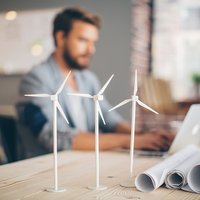Consequences of the Corona Pandemic and Climate Protection
Discussion paper of the Wuppertal Institute suggests a long-term perspective

Discussion paper of the Wuppertal Institute suggests a long-term perspective

Automakers close factories, the stock exchange crashes, empty streets and cafés everywhere and suddenly working from home is recommended or even required for a large part of the working population in Germany. The Corona pandemic is defining our current everyday life and hitting Germany, Europe and the world at a time when there are a multitude of huge challenges to be solved already. Economic aid is indispensable during and in the aftermath of such a crisis, but the primary focus is to prevent the spread of the pandemic and limiting the health implications. Economic stimulus packages and structural aid are an effective means of overcoming the long-term economic consequences of such disruptive developments. However, they must not be distributed according to the "watering can principle"; financial support must be provided in a future-oriented manner for urgently needed investments. The aim must be to promote the necessary sustainable transformation processes within our economy and society, such as climate protection. According to the Wuppertal Institute's Scientific Managing Directors, Prof. Dr. Manfred Fischedick and Prof. Dr. Uwe Schneidewind, the preparations must be made now. The current discussion paper shows which criteria and measures are needed.
Economically, Germany, Europe and the world are heading for a crisis situation that threatens to overshadow the dimension of the 2008/2009 financial crisis: companies and freelancers are under extreme pressure, supply chains and production must be maintained. The federal and state governments are currently creating a mix of economic measures to stabilise companies, businesses and industry in the short term. "This is right and necessary and it must be done as unbureaucratically and pragmatically as possible in order to have a quick impact. In the aftermath of the corona crisis, further investments are necessary. Economic stimulus packages are an effective means. However, the experiences from the economic and financial crisis of 2008/2009 have shown that these economic stimulus packages have a long-term effect and therefore need to reflect the broader range of transformation challenges of the coming years," says Prof. Dr. Manfred Fischedick, Scientific Managing Director of the Wuppertal Institute. Clear criteria are needed for measures to be aligned, he states.
Three-phase model for dealing with Corona pandemic
In the current discussion paper "The Corona Crisis and Climate Protection – Keeping Long-Term Goals in Mind", the two Scientific Managing Directors of the Wuppertal Institute, Prof. Dr. Uwe Schneidewind and Prof. Dr.-Ing. Manfred Fischedick, distinguish between health care (1), avert short-term economic crises (2) and long-term transformation (3).
Short-term economic support includes, for example, the recently adopted short-time working allowance, easier access to credit and state guarantees, as well as direct grants to affected groups. These emergency aid measures must now be implemented pragmatically and quickly, but: "The long-term aid measures must set clear priorities in terms of sustainable economic and social development," emphasise Schneidewind and Fischedick. According to the authors, the so-called "long-term transformation" includes mainly central measures for climate protection, for which state investment is indispensable. This applies, for example, to making the energy-intensive industry ready for the future and supporting important measures on the way to greenhouse gas neutrality. That includes the conversion of steel production to hydrogen-based (green) production processes and the gradual but consistent closing of material cycles as part of a more circular economy. In the building sector, further investments in building refurbishment and the replacement of heating systems are planned. Regarding transport, this means accelerating the switch to electromobility in the passenger car sector, but also in the freight transport sector – the latter can be achieved by setting up overhead line structures along motorways.
Press release
Wuppertal Institute
Responsible for content: Professor Uwe Schneidewind, Scientific Managing Director
Contact: Christin Hasken, Head of Communications and Public Relations
Tel.: +49 202 2492-187
Fax: +49 202 2492-108
E-mail: christin.hasken@wupperinst.org
Further information
Downloads
Printable pictures

Drei-Phasen-Modell zum Umgang mit der Corona-Pandemie hinsichtlich Gesundheitsvorsorge (1), kurzfristiger ökonomischer Krisenabwehr (2) und langfristiger Transformation (3). Quelle: Wuppertal Institut

Three-phase model for dealing with the Corona pandemic regarding health care (1), avert short-term economic crises (2) and long-term transformation (3). Source: Wuppertal Institute
